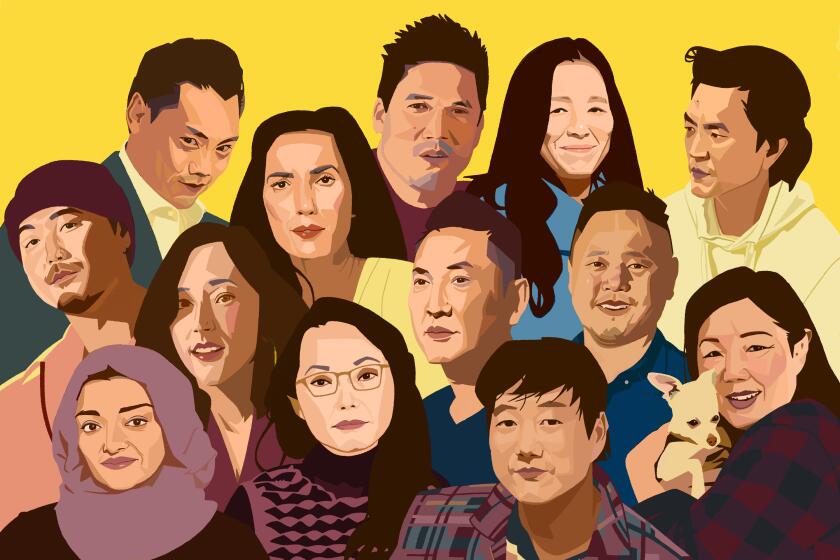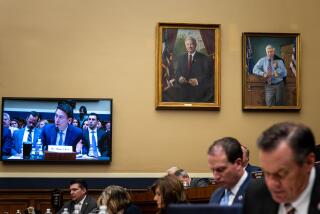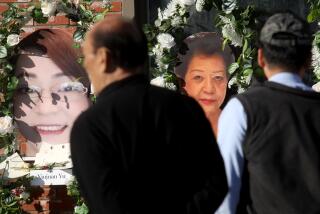Column: ‘It’s just too much’: Asian Americans confront xenophobia, economic devastation and the coronavirus
It’s been a long week for all of us, so forgive me if I don’t have the energy to participate in a debate about whether President Trump calling the virus “Chinese” is racist.
Of course it is. And it’s something we’ve all seen before, when Vincent Chin was murdered in 1982 during a recession that politicians blamed on Japan; when Muslim Americans were targeted after 9/11; when the AIDS crisis was blamed on gay men; when Japanese Americans were sent to incarceration camps during World War II. When this country faces an existential threat, fear looks for a target.

I’m weary of this debate because the harm to Asian Americans is already done, and what a pundit says will never change that. Nor will yelling at Trump do any good — he has repeatedly shown throughout his presidency that he values his ego over the safety of the American people.
What we need to be talking about is how to protect people and neighborhoods from more economic and physical harm. This epidemic threatens and affects all of us in ways we are all still trying to understand, but what’s increasingly clear is that the most permanent, drastic effects will be on the most vulnerable among us.
Asian American communities whose support systems have already been eroded by gentrification are fighting to protect their most vulnerable residents. And for months, they’ve been suffering an economic slowdown fueled by misplaced xenophobic fear.
On Monday, I called community leaders in Chinatown. Many Asian enclaves, like Chinatown, house large, low-income senior populations who are language-isolated — people who are most vulnerable to COVID-19 but least equipped to weather it.
“Asian Enough” is a podcast about being Asian American — with guests like John Cho, Lulu Wang, Mina Kimes, Margaret Cho and Padma Lakshmi.
In Chinatown, which houses more than 2,000 seniors in various living facilities, a longtime activist, King Cheung, says volunteers with the Chinatown Community for Equitable Development are trying to organize shopping runs for seniors. Many of them lack internet access and speak dialects for which official information has not been translated, so volunteers have been knocking on doors and trying to get the word out.
Don Toy, another community leader, has been setting up lunch orders for the residents of Cathay Manor, a senior living facility on Broadway. He gets the news to seniors by making announcements over the building’s PA system. It’s been tough persuading the seniors to stay at home because many define themselves by their routines. Autonomy is something they’ve worked hard for, and some of them don’t have their families around to help, Toy said.
On Tuesday, I reached out to Kristin Fukushima, managing director of the Little Tokyo Community Council.
In Little Tokyo, she said, the widespread move to working remotely has eliminated the weekday lunch crowd that many businesses rely on. The council is trying to organize donations and deliveries of food, toilet paper and other materials to seniors in Little Tokyo Towers, Miyako Gardens and several other facilities. Other volunteers are translating emergency information into Japanese and Korean and compiling a list of resources for small businesses as well as ways for people to support them.
When I see Fukushima and others working around the clock, leading Zoom calls with dozens of volunteers and sending emails at 3 a.m., I’m reminded that ethnic communities in Los Angeles have always relied on a human safety net made of people like Fukushima, Toy and Cheung. That human safety net needs your support more than ever right now.
On Wednesday, a few hours after President Trump insisted on labeling the virus a Chinese virus in a news conference, I spoke with Jack Lee, whose son attends the fourth grade at a mostly white elementary school in Orange County.
During a basketball game, two classmates accused his son of having the coronavirus. Lee’s son said a curse word in response, and of the three children, he was punished by school authorities most harshly.
Lee was angry. He wrote a long letter to the principal. He made sure to tell his son that it was OK to defend himself. He’s never had to talk with his son about race before. His own parents, immigrants from Taiwan, never had to talk to him about it either. But now he’s looking for the right words, Lee said.
“I think there are some deeper conversations we’re going to need to have,” Lee said.
On Thursday, I spoke with Andy Lam, part-owner of Alice’s Kitchen, a popular Hong Kong restaurant in Monterey Park. Asian neighborhoods like those in the San Gabriel Valley have been experiencing slowdowns for several weeks already because media reports and public comments about the virus have repeatedly associated the coronavirus with Asian culture, food and identity.
Now, “closed temporarily” signs are being replaced by “for lease” signs. Lam, who worked for years in the restaurant supply business, said he knew of more than a dozen Chinese restaurants that had already closed. He had to send most of his employees home, and he and two other co-owners of the restaurant are working the kitchen themselves to field the rare takeout order. His friends are asking one another whether they should buy a gun.
The most stressful part is not knowing what the government will do next, Lam said.
“If they order us to shut down, there’s nothing we can do,” Lam said. “I can’t even tell you how long we will last.”
At the end of the day, I called my mother, who works at a hospital in Northern California. I asked her to stay home, but her boss told her if she didn’t show up, she would lose her job. At work, patients sometimes refuse to be seen by her, because suddenly an Asian woman in a face mask is a threat.
On Friday, I talked to Khinn Muy Ung, 52, who worked as a dealer at Hollywood Park Casino until March 14, when widespread quarantine measures were announced and she lost her job. She’s not sure if she’ll have work when the restrictions lift.
On top of that, she lives in a building in Chinatown where for the last year landlords have been trying to evict a population of low-income seniors, mostly of Southeast Asian descent.
Volunteers from the Chinatown Community for Equitable Development organized the tenants to protest at the landlord’s multimillion-dollar home in Brentwood last October. The landlord sold the property, but the new landlord was no different.
And so in February, as officials announced the first confirmed cases of coronavirus in California, she received another 60-day notice to move out.
Ung said she had no place else to go. Her family lives far away, and she can’t afford market rent for a one-bedroom apartment, especially now that she has no money coming in. Her rice costs have doubled since her Chinatown grocery store, Ai Hoa, closed. And she’s scared. A few weeks ago, she was jogging in the park and a man followed her, shouting that she was Chinese and blaming her for bringing the virus to America.
“I just pray to God. Just let us live,” Ung said. “Let us have peace. I don’t understand what’s going on.”
Ung is a survivor who has dealt with fear and helplessness before, as a young girl in Cambodia during the genocide of the 1970s. She survived the long walk through the countryside to refugee camps in Thailand. She’s dodged bullets and land mines and endured beatings and starvation.
But she doesn’t know how she’ll survive this. A war you can run from, but eviction, layoffs, racism and a lethal new virus?
“It’s too much, Frank,” Ung said. “It’s just too much.”
She’s crying now, and all of a sudden I’m crying too, stuck here in my apartment, where I’ve been for two weeks, one self-quarantining man with a keyboard, working on an article that will either add to the noise or be drowned out by it.
I tell her I agree, it is too much, it’s not fair. But there’s nothing else to say, so I don’t say anything, and for a minute, we’re just on the phone, crying together.
More to Read
Sign up for Essential California
The most important California stories and recommendations in your inbox every morning.
You may occasionally receive promotional content from the Los Angeles Times.











